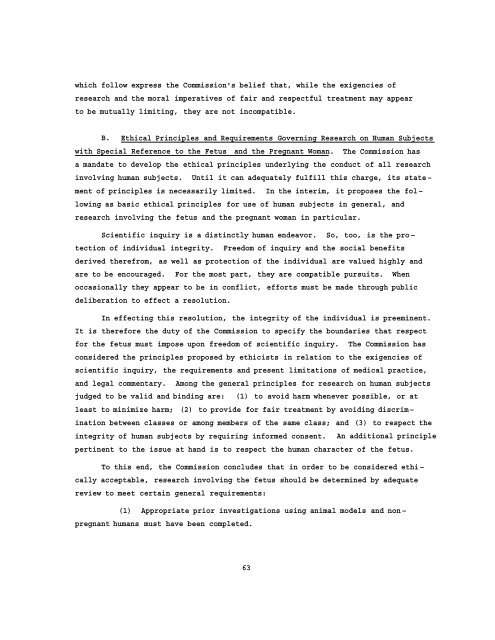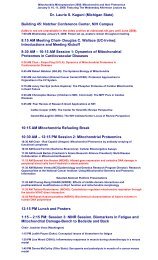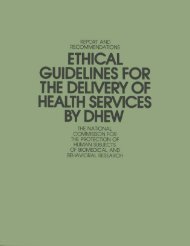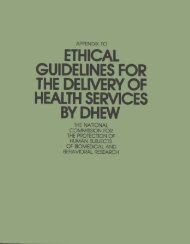RESEARCH ON THE FETUS - National Institutes of Health
RESEARCH ON THE FETUS - National Institutes of Health
RESEARCH ON THE FETUS - National Institutes of Health
You also want an ePaper? Increase the reach of your titles
YUMPU automatically turns print PDFs into web optimized ePapers that Google loves.
which follow express the Commission's belief that, while the exigencies <strong>of</strong><br />
research and the moral imperatives <strong>of</strong> fair and respectful treatment may appear<br />
to be mutually limiting, they are not incompatible.<br />
B. Ethical Principles and Requirements Governing Research on Human Subjects<br />
with Special Reference to the Fetus and the Pregnant Woman. The Commission has<br />
a mandate to develop the ethical principles underlying the conduct <strong>of</strong> all research<br />
involving human subjects. Until it can adequately fulfill this charge, its statement<br />
<strong>of</strong> principles is necessarily limited. In the interim, it proposes the following<br />
as basic ethical principles for use <strong>of</strong> human subjects in general, and<br />
research involving the fetus and the pregnant woman in particular.<br />
Scientific inquiry is a distinctly human endeavor. So, too, is the protection<br />
<strong>of</strong> individual integrity. Freedom <strong>of</strong> inquiry and the social benefits<br />
derived therefrom, as well as protection <strong>of</strong> the individual are valued highly and<br />
are to be encouraged. For the most part, they are compatible pursuits. When<br />
occasionally they appear to be in conflict, efforts must be made through public<br />
deliberation to effect a resolution.<br />
In effecting this resolution, the integrity <strong>of</strong> the individual is preeminent.<br />
It is therefore the duty <strong>of</strong> the Commission to specify the boundaries that respect<br />
for the fetus must impose upon freedom <strong>of</strong> scientific inquiry. The Commission has<br />
considered the principles proposed by ethicists in relation to the exigencies <strong>of</strong><br />
scientific inquiry, the requirements and present limitations <strong>of</strong> medical practice,<br />
and legal commentary. Among the general principles for research on human subjects<br />
judged to be valid and binding are: (1) to avoid harm whenever possible, or at<br />
least to minimize harm; (2) to provide for fair treatment by avoiding discrimination<br />
between classes or among members <strong>of</strong> the same class; and (3) to respect the<br />
integrity <strong>of</strong> human subjects by requiring informed consent. An additional principle<br />
pertinent to the issue at hand is to respect the human character <strong>of</strong> the fetus.<br />
To this end, the Commission concludes that in order to be considered ethically<br />
acceptable, research involving the fetus should be determined by adequate<br />
review to meet certain general requirements:<br />
(1) Appropriate prior investigations using animal models and nonpregnant<br />
humans must have been completed.<br />
63











